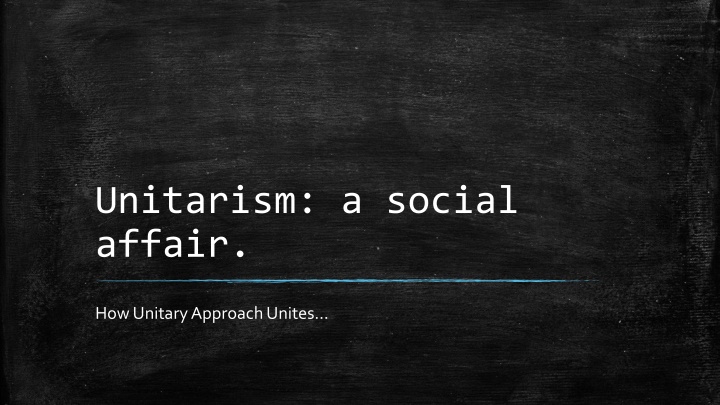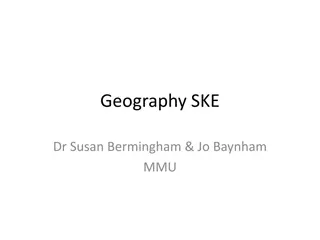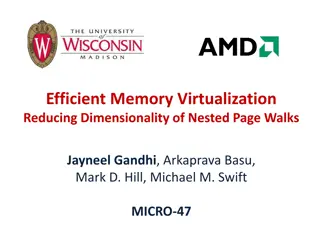
Unitarism and Pluralism in Organizational Contexts
Explore the concepts of unitarism and pluralism in organizational settings, their impact on industrial conflict, and how they shape employee-employer relationships. Discover the significance of intrinsic motivation, cultural values, and effective human resource practices in fostering unity and success within organizations.
Download Presentation

Please find below an Image/Link to download the presentation.
The content on the website is provided AS IS for your information and personal use only. It may not be sold, licensed, or shared on other websites without obtaining consent from the author. If you encounter any issues during the download, it is possible that the publisher has removed the file from their server.
You are allowed to download the files provided on this website for personal or commercial use, subject to the condition that they are used lawfully. All files are the property of their respective owners.
The content on the website is provided AS IS for your information and personal use only. It may not be sold, licensed, or shared on other websites without obtaining consent from the author.
E N D
Presentation Transcript
Unitarism: a social affair. How Unitary Approach Unites
Social Theory: Foxs Frames of Reference (Fox, 1966) Beyond Contract (Fox, 1974) Pluralism is part of the industrial conflict problem. Unitaristapproach organisations will see success in if they draw on community cultural values (Fox, 1974).
The Unitary Argument: Psychological and Sociological Perspective motivation and power Procedures and Policy good Human Resource Practices The Organisation cultural and employee relations
Unitarist argument.. Pluralism is part of the problem. Unitarism unites us all.
Foxs Frames of Reference.. The Social Theory and Psychological perspective. attitudes and behaviour in economic and organisational contexts are conditioned by contingent, intersubjective conceptual structures arising both from general processes of socialisation, and from direct experience in the workplace (Fox, 1966)
Pluralism.. Exchange of labour for money No party buys into each other s values or aims. Begins from point of discord Anticipates conflict Of it s time (transition from Victorian Industrialisation to Postmodern work place)
Unitary.. A social relationship: a cooperative pursuit of common aims and values, drawn on effective division of labour based on skill. The Ideal Employee-Employer Relationship
Motivation Theory.. Intrinsic Motivation to be valued, developed, recognised and to provide altruistic contribution to wider social community. A study of workers from eight countries found that less than a third of workers would stop work altogether if they won the lottery. The majority of workers in all countries would continue working (Sutton, 2015).
Post Modern Organisation.. Post modern organisations give individuals the opportunity to flourish in a way that they couldn t otherwise accomplish organisations provide employees with the power to be their best..
Power to the People Individual Knowledge Worker.. Foucault s Theory of Power/Knowledge (Foucault, 1980): Power comes from and resides within knowledge It does not reside within particular institutions employed at all levels Knowledge creates, and replicates, individual identity and is seen as relational one can only ever be seen to be something in relation to something else ) Foucault, cited in Townley, 1990:522).
Post Modern Organisation.. Organisations have changed the way that they view and value their employees. Knowledge workers have more power and influence in flatter organisations. Knowledge workers sculpt and direct organisational goals and aims through creativity and innovation
Power to the Employee.. Move to team work, away from strict management Increase individual intrinsic value and sense of shared goal Reaffirms personal identity through relationship with organisation
Therefore.. Pluralism is out modedand damaging: Foucault -what counts as truth depends on, or is determined by, the conceptual systems in operation (Townley, 1990:519) If you come with a concept that anticipates conflict, there will be conflict.. If you come with a unitaristperspective, both employee and organisation will thrive.
Policy, procedures, and practices... a regime which provides human beings no deep reason to care about one another cannot long preserve its legitimacy Richard Sennett
Tipping the scale. Social partners High performance flexibility (3) Mutual gains
Knowledge based work systems... Toyota-GM: NUMMI Thursfieldand Kellie (2013) Paradox of Management Narrowing the gap: Atlassian
The Unitarist Organisation.. Businesses are organisations that are unitaristic one centre of power , one vision, one interest Pluralism destroys business multiple centres of power, multiple visions of interest.
The Unitarist SME SMEs are dominant in business (99.3% in the UK) and are largely unitaristic 76% of 5.3m (ie4 Million) SMEs are non-employers due to the fear of pluralism and radicalism
Lets unite! Let s get rid of twin envoys of conflict ; pluralism, and its cousin radicalism. Let s enhance job creation and sustainability in the UK.
In conclusion Pluralism is outmoded; work is more than money and conflict. Human Resource Management supports and accentuates the Unitaristrelationship. Today s post-modern organisations are community businesses that value social partnership working.





